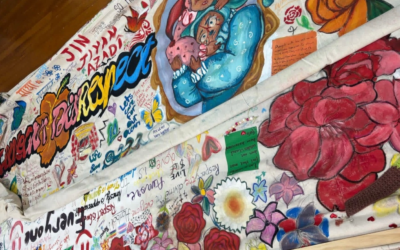
“Who uses typewriters anyway?” is a lyric by American singer-songwriter, Taylor Swift, from her song The Tortured Poets Department. Though author KT Major doesn’t use a typewriter in 2024, she likes to think of herself as part of the fictional, literary club “The Talented Writers Department” …
Do you have any tips for university students, who are emerging writers but haven’t yet submitted their work to any publication or a competition?
Major: “Submitting your work to literary magazines or competitions is akin to putting your heart on a platter and inviting people to stab it with a fork. The rejection sucks – and there will be many, many rejections.
Like most writers, it’s easy to feel one or all the following:
- Despair that your precious unicorn of a story, one you thought the world would love and treasure, will now have to be changed yet again and mutilated beyond recognition.
- Gallows humour as you add the latest rejection to the growing corpse pile of dead stories.
- Deep-seated fear as you re-read your older work and wonder if you have lost your touch completely; or
- Certainty that you have chosen the wrong path, and you should rage quit and feed your work to a smoking bonfire.
So, my advice is this: instead of rage quit, I encourage you to rage submit. There are hundreds of other online and print journals out there that specifically look for emerging writers. Your story will find a home one day.
But you can’t do this blindly. Do this in a smart way with your eyes open. Use your rage from rejection to fuel you. Read, and study as much as you can. Read the literary mags and journals in which you want to be published. Read a lot of fiction. Read a lot of nonfiction. I make it a point to read the winning stories or past anthologies of every competition /journal callout I’m interested in entering. Examine your own writing and take the time to evaluate your craft.
A wise author James Roy once told the WestWords class of 2023:
‘If you get rejected, grieve for a day. If you get accepted, celebrate for a day. Then get on with the writing.’”

In this digital age, do authors have to be prepared to not only write books and attend events requiring public speaking but also navigate social media?
Major: “Yes. I know it can be draining, and tiring, and lots of writers just want to be introverts and write in darkened rooms with the glow of your laptop illuminating your face, but all the socialising and networking and profile building is honestly just part of life.
To be a published author, the publisher will expect you to attend events and promote your own books on all these platforms. As an indie writer – guess what! It’s much the same. If you pace yourself, take breaks from social media if you need to, and keep up with the writing.”

What has been the most helpful tool you’ve learned when it comes to writing?
Major: “I found that tools and gadgets are helpful, but not as important as forming a writing habit. Writing is a lot like exercise. As life gets busy and hectic you must make time for it, whether it’s fifteen minutes on the train, or early in the morning. And you can do your thinking/imagining, before you even put pen to page, while on the move.
I use my commuting time to read or listen to writing courses and podcasts. I read at my lunch breaks or write down some thoughts. I write feverishly when everyone in my house is asleep. There is no magic formula, and every writer is different. If you’re one of those writers whose creativity and words flow like snot on a winter’s day and you churn out pages and pages in one sitting, please share your secret.”
You can follow KT’s writing adventures on Instagram @projektmajor, and check out more of her work at https://www.ktmajor.com



